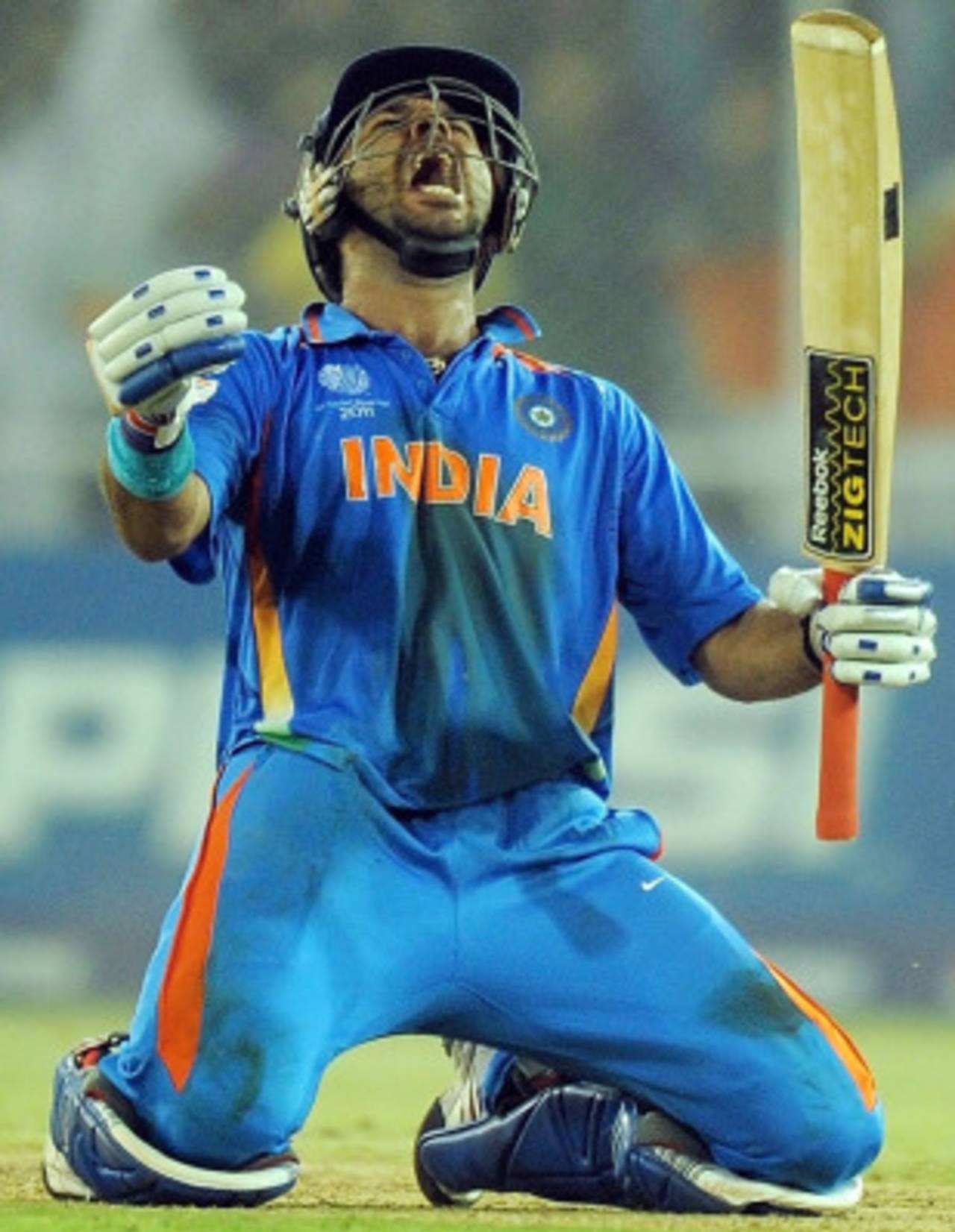It is a matter of some disappointment that cricketers rarely write good books - when they do write them, that is. It is amazing how interesting careers look infinitely more boring, how exciting events are clothed with terrifyingly dull prose, and how lives become scorecards drearily described in an attempt to fill pages. Then comes
Yuvraj Singh's book. And you want to read it.
This is really a book of two stories, closely intertwined, within one narrative. It is the story of the 2011 World Cup win, but played out against the backdrop of a deadly shadow. As India inched closer to a second World Cup victory, a giant tumour, eventually 15cm x 11cm x 13 cm was growing within Yuvraj and pressing against a lung and artery. He couldn't sleep, he was throwing up, he was constantly breathless, and he was winning Man-of-the-Match awards. The doctors told him afterwards that he could have died of a heart attack because the artery was being squeezed - and no one would have known he had cancer.
And so it needs to be read at two levels. One, as a sportsman's account of how the biggest event in his life unfolded, and two, of the fear of fighting something he couldn't see. He didn't know what it would do, whether it would take away from him the only thing he was good at, and, worst of all, whether it would claim him. When we write of others, we use these words easily but Yuvraj's story affected me, had me thinking: what if it was me, what if it was someone in my family? And then I tried remembering the World Cup all over again.
Were there pictures of him desperately trying to get up from under five or six bodies piled on him in celebration because he could no longer breathe? Do I remember that battle cry after the quarter-final against Australia in Ahmedabad? Why was he going on about wanting to do it for Sachin?
And it is an honestly written book. He talks about problems between his parents, the stress, and then the relief, of them living apart, of how it affected his younger brother, and of how cricket became an escape from it all.
There is respect for what his father tried to do, but it doesn't gloss over the uneasy relationship between the two. Yograj Singh once threw a glass of milk at Yuvraj, which he ducked under but saw break a window behind him, because he hadn't scored enough runs. But Yuvraj also remembers his father's advice from when he was growing up, "Play straight, down the ground", at a crucial time in the World Cup quarter-final.
There is, too, the frustration of not really making it in Test cricket, and he is quite open about putting in the book a comment from VVS Laxman, about how he knew two Yuvrajs: one who believed he could win every one-day game, and the other who was a bundle of nerves in a Test match.
Yuvraj's book needs to be read at two levels. One, as a sportsman's account of how the biggest event in his life unfolded, and two, of the fear of fighting something he couldn't see
But eventually this is the story of a fight against an illness that scared him like nothing had; of someone who tried to cure his cancer with acupuncture, and of a humane doctor who gave him reassurance and told him the truth. And it is a mother's story; of a woman who dropped everything and, as he says, gave birth to him again. Unless you are hard and emotionless, you will find it difficult not to be moved by Shabnam Singh's story. And by the details of the love of the Indian cricket fan, of students in Indiana who made cards and brought food, and simple people who helped with shopping and cooked when needed. Those are not isolated stories. Mothers care, friends help, good samaritans emerge, but because it is Yuvraj, because it happened either side of the World Cup, you read it all and you feel good.
And you get an insight into people around Indian cricket. You read of trainers who didn't rest, and didn't let Yuvraj ease up on his routine; of team doctors who woke up at 4am to cajole a nervy match-winner to bed, who take great efforts to find the right sleeping pill before a World Cup final; of team-mates who call only to tell stories that will raise his spirits; and yes, of administrators who gave assurances of looking after everything. Indeed, Yuvraj talks about the support system in Indian cricket and wonders how he would have fared if he had been playing another sport.
It is a book that could have become syrupy, melodramatic and very Bollywood. Or it could have told the story with a literary flourish that wouldn't quite have been Yuvraj. At most times it stays simple, and it is in doing that and yet telling the story that Sharda Ugra plays her role. The writer with flair does come through fleetingly, but she doesn't allow style to dominate. A biography would have been very differently, but I suspect more easily, written.
Far too much of Indian cricket is shrouded behind scorecards, irrelevant quotes, noise, glamour and money. There are some lovely stories to be told that the lure of the daily media box office doesn't always allow. It is good to see one come up sometimes.
Harsha Bhogle is a commentator, television presenter and writer. He is currently contracted to the BCCI. His Twitter feed is here
